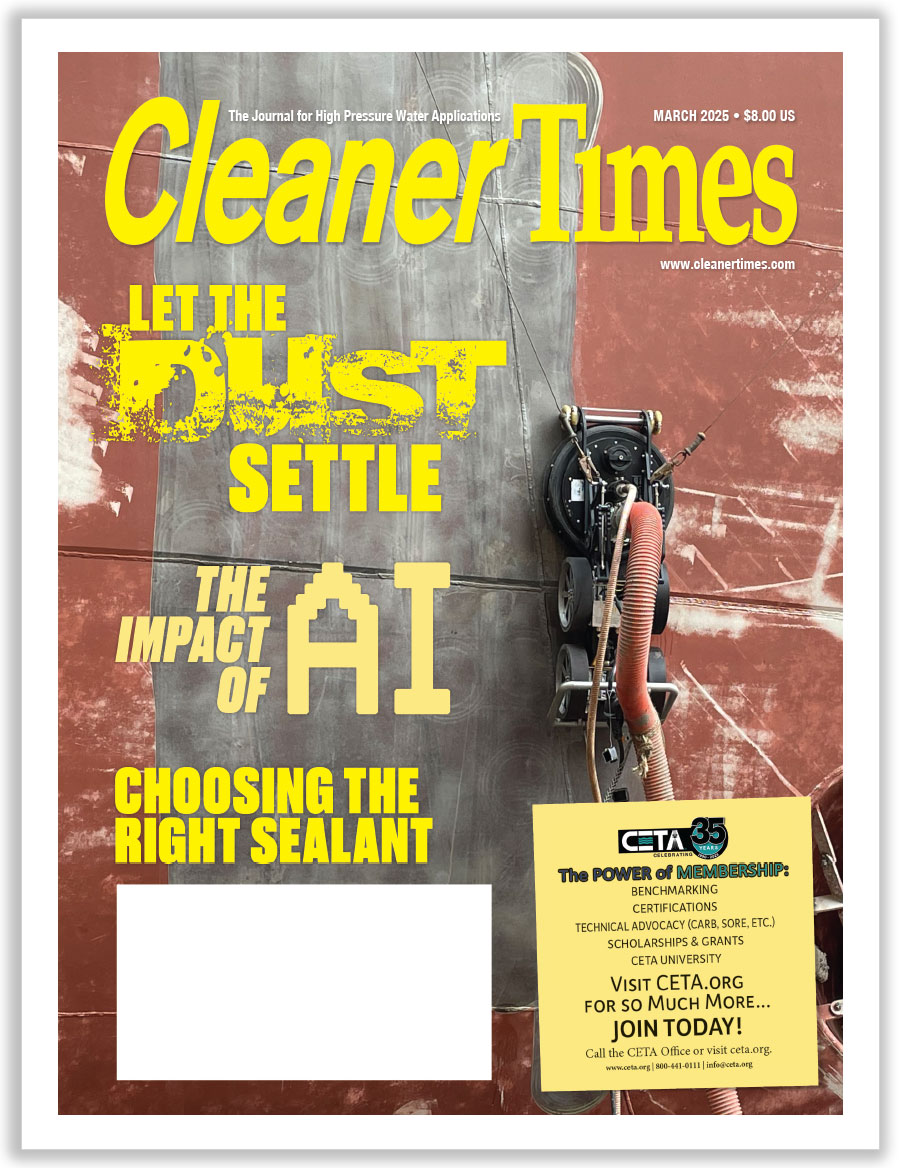
Financial: Finding the Right Tax Professional
Written by Mark E. Battersby | Published November 2024

When a pressure cleaning business has outgrown tax preparation software or feels it would be better served by a new tax professional, the question is, How do you find a good and affordable tax professional?
Finding the right professional requires an inventory of what the pressure washing operation needs in the way of services and advice and, most importantly, how much it can afford to pay for that advice or services. It is important to determine beforehand just how much of the work you and the operation’s employees will do and how much of it will be done by the professional.
The Question Of Who
For any return involving the complexities of a pressure washing business, an experienced tax professional is usually required. And, the various types of tax professionals bring different levels of skills, education, and expertise to the table.
Among the various types of tax professionals are accountants, certified public accountants (CPAs), enrolled agents (EAs), attorneys, and others without a professional credential. EAs, CPAs, and attorneys can represent the pressure cleaning operation—or its owner—in front of the IRS on audits, payments, collection issues, and appeals, should it come to that.
In many cases the tax professional hired should be able to do more than merely prepare the operation’s tax returns. The professional should work throughout the year tracking income and spending to ensure the operation doesn’t have a cash flow problem.
Many tax professionals inspect a pressure washing operation’s books and records to ensure that all income is being reported and the business claims all of the deductions and credits available to it. A tax professional can also help answer questions such as whether the operation is subject to excise taxes or needs to file employment tax returns.
Finding
Some pressure washing businesses—and their owners—may only need help with basic returns. Others may require a professional who can handle complex tax situations and be available for consultation throughout the year.
Once the scope of services required and the available options are known, the best way to find someone to prepare the operation’s tax returns, or to render needed tax advice, is with a referral from business associates, the business’s banker, or an attorney.
Asking someone within the industry who they recommend can be helpful for finding a tax professional well-versed in the needs of the pressure cleaning operation. While this method is more time-consuming than a web search, it can help ensure finding a professional who is able to expertly handle the operation’s tax returns.
As the pressure washing business owner seeks a tax professional of a like temperament, knowledgeable about their industry, and experienced enough to utilize every legitimate deduction and credit available, a professional organization may help.
The Choices
Because most professional organizations have codes of ethics, conduct standards, and certification requirements, professional organization membership is a place to both find and check the professional’s credentials. Among these professional organizations are the following:
• The American Institute of Certified Public Accountants (AICPA) — https://www.aicpa-cima.com
• National Association of Tax Professionals (NATP) — https://www.natptax.com
• National Society of Enrolled Agents (NAEA) — https://www.naea.org
Typically attorneys specializing in tax law are not ardent disciples of tax return preparation. Such legal professionals are most often confined to complex transactions, issues, and document preparation. Because non-legal tax professionals offer only limited client confidentiality, for issues requiring absolute confidentiality, consider the use of attorneys.
When it comes to helping with tax preparation or tax questions, the Internal Revenue Service (IRS) offers free advice— but it is free advice that is often difficult to obtain. The IRS will not advocate aggressive tax solutions, nor can their answers be taken as gospel. In fact, the IRS will not stand behind incorrect advice or even its erroneous interpretation of its own rules.
Compatible
With recommendations in hand, an interview should be requested. A lot can be learned from an interview; but tax time is busy, so long conversations may be rare. That interview should answer the following questions:
Is the tax professional’s style compatible? Does the professional’s approach to the rules match the goals of the pressure washing business and its owner?
How and what will be charged for the services needed? While no tax pro should be chosen based on fees alone, it pays to compare the fees of several professionals.
Can the professional work with the operation’s recordkeeping, bookkeeping, or POS system? If a system such as QuickBooks or other computerized tools are used, can the professional provide guidance if needed?
Is the tax professional available for questions or assistance other than during the tax season? Availability is crucial. Even after the tax returns have been filed, the best tax professionals will take calls, respond to emails, or welcome in-person visits.
Does the professional prepare all returns or are they delegated to staff, and how will that affect the fees charged? In large accounting firms there are usually many employees, ranging from CPAs to junior staff members, usually billing at different rates.
How will the operation’s data be kept secure? Every tax professional should have systems in place to protect confidential information in their possession.
Are all returns filed electronically? With some exceptions, the IRS requires tax preparers to file electronically. Tax professionals using paper returns may be doing taxes part-time or it could be a sign to keep looking.
Always check a tax professional’s credentials.
Checking And Rechecking
Keep in mind that finding the right tax professional for the pressure cleaning business is similar to shopping for a new vehicle, equipment, or anything else. At the very least, comparing fees, services provided, and compatibility should play an important role in every search.
Tax return chains such as Jackson Hewitt, H&R Block, and Liberty Tax may be able to easily handle basic returns, but they aren’t always trained to provide in-depth tax advice or return preparation. Since only CPAs and enrolled agents can represent taxpayers before the IRS in all matters, including audits, collections, and appeals, the chain tax return preparer may have to resort to a referral to someone more qualified, but at what cost?
Tax professionals who participate in the IRS’s annual filing season program have a limited right to represent taxpayers at audits of returns they have prepared and signed. For more complex returns or help with tax-reduction strategies, it is often better to go with an EA, CPA, or tax attorney.
And remember, the professional used for tax advice need not be the same used for preparing the pressure cleaning operation’s tax returns.
Hiring The Right Tax Pro
A good, competent tax professional can usually advise an owner on the most effective way to structure the pressure cleaning business. Even with an already-operating business, a tax professional can help the owner, partner, or shareholder determine whether another type of entity might be advisable and perhaps reduce the annual tax bill.
A knowledgeable tax professional can also help in avoiding many taxrelated scams. The IRS provides tips on avoiding unscrupulous tax return preparers, and it also investigates paid tax return preparers who act improperly.
Any business owner or manager who has been financially impacted by a tax return preparer’s misconduct or improper tax preparation practices can make a formal complaint. To report abusive tax return preparers or suspected tax fraud, the IRS’s Form 14157, Return Preparer Complaint and Form 14157-A, Tax Return Preparer Fraud or Misconduct Affidavit, are used by individuals, sole proprietors, and single-member LLCs to report a tax preparer’s misconduct.
Although these tax preparer complaint forms don’t let anyone off the hook for paying taxes owed, they allow every individual taxpayer, sole proprietor, and single-member LLC to anonymously report tax preparer misconduct.
Shopping Around
Most pressure cleaning business owners use a professional at some point—most commonly to prepare tax returns. In fact, according to the IRS more than half of all returns filed were filed by tax professionals. However, it can’t be emphasized enough that shopping for a professional is virtually a necessity in today’s business economy.
Fortunately, many professionals offer free first meetings for discussion of expectations, services needed and provided, extent of involvement by the professional, the portion of the work the operation’s employees are expected to shoulder, time constraints, and, above all, costs.
Finding a professional should be more than a search for the least expensive or most convenient option. Although money should never be the sole criteria for selecting a tax professional, remember that it is not “tacky” to discuss fees before engaging their services.
Comparison shopping to find a tax professional who can provide the level of service required at a price that the business—and you—can afford is a process that shouldn’t be ignored or postponed.
The bottom line is it should be kept in mind that regardless of the source of any advice or who prepares the pressure washing operation’s tax returns, it is the operation’s owner who is responsible for everything on that return.





